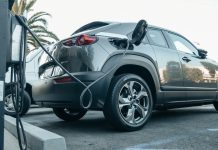Last week, representatives for the National Automobile Dealers Association (NADA) and Alliance for Automotive Innovation jointly petitioned President Donald J. Trump to designate automotive repairs, maintenance and sales facilities as essential business during the coronavirus pandemic. The mode would ensure that dealerships would remain open while many businesses nationwide – and worldwide, for that matter – are forced to close their doors.
Late last week, the Trump administration classified automotive service as an essential service, according to the Department of Homeland Security’s CISA page. The move allows service departments to continue in operation at the moment, keeping America moving with their current vehicles.

Despite the joint letter to the POTUS, the designation doesn’t include automotive sales yet. And for many Americans – even those who work at dealerships – the questions often comes up, “Are vehicle sales truly an essential service?”
Related: How Dealers Can Address the Effects of COVID-19
Why NADA is Advocating for Dealers as Essential
In a recent release from Juliet Guerra, NADA Director of Media Relations, three points are explored to justify the position of dealership sales departments as an essential business.
- Leases are set to expire soon. Guerra references J.D. Power data that says more than 1.8 million vehicle leases will expire between now and July 2020. It stands to reason that those lessees will need to make a decision regarding their vehicle. Traditional leasing offers the lessee options to either return their lease, buy out their leased vehicle, or extend their lease in some cases. Since the lessee is under contract, it becomes a legal matter as much as a retail one.
- Americans have limited access to public transportation. In New York, pedestrian and cycle traffic have increased as public transportation options have declined. As Americans are limited to travel for work or to purchase essential items, or to care for sick and elderly loved ones, thousands will need to turn to car dealerships to purchase a vehicle. In 2019, nearly 47,000 vehicles were purchased every day, a statistic that will be suppressed in 2020 due to COVID-19. Yet, there are many that will be unable to provide essential services without access to a vehicle retailer.
- Cars need to be replaced. A third point made by NADA’s Juliet Guerra is regarding out-of-service vehicles. More than 34,000 vehicles are scrapped daily in the United States as they have exceeded their useful lifecycle. As these vehicles are retired from use, often due to safety concerns or collisions, owners need to replace these units. There’s no way to know whether these vehicles are personal vehicles or fleet vehicles for essential and non-essential businesses, which makes it necessary to ensure dealerships remain open.
 More than Just Personal Vehicles
More than Just Personal Vehicles
In addition to light vehicles, dealerships offer commercial and medium-duty vehicles for fleets. That’s evident with Ford’s Transit and Transit Connect lines, Chevrolet’s Express lineup and HD trucks, and those from other manufacturers. Should dealership sales be deemed non-essential and showrooms forced to lock their doors, it’s clear that a gaping hole would be exposed in the automotive industry. NADA’s representatives continue to pursue the Trump administration to consider dealership sales as essential, and we’ll report when a decision has been made.
Related: Adam Arens of Patriot Automotive Group Discusses His Strategy for Working Through COVID-19
Did you enjoy this article from Jason Unrau? Read other articles from him here.
Car Biz Today, the official resource of the retail automotive industry.


While you’re here, don’t forget to subscribe to our email newsletter for all the latest auto industry news from CBT News.
This has been a JBF Business Media production.








